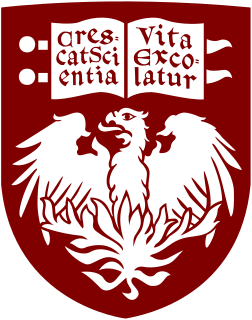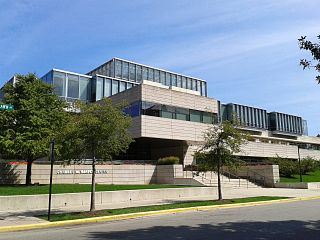
The University of Manitoba is a Canadian public research university in the province of Manitoba. Founded in 1877, it is the first university of western Canada.

The University of Chicago (UChicago) is a private research university in Chicago, Illinois. Founded in 1890, its main campus is located in Chicago's Hyde Park neighborhood. In Fall 2021, it enrolled 18,452 students, including 7,559 undergraduates and 10,893 graduate students.

A graduate school is a school that awards advanced academic degrees with the general requirement that students must have earned a previous undergraduate (bachelor's) degree. A distinction is typically made between graduate schools and professional schools, which offer specialized advanced degrees in professional fields such as medicine, nursing, business, engineering, speech–language pathology, or law. The distinction between graduate schools and professional schools is not absolute since various professional schools offer graduate degrees and vice versa.
Habilitation is the procedure to achieve the highest university degree in many European countries in which the candidate fulfills certain criteria set by the university which require excellence in research, teaching, and further education. Its qualification certifies the ability to be a “full professor” in these countries. This procedure also usually culminates with a scientific lecture with colloquium as well as a public inaugural lecture given by the applicant.

Lecturer is an academic rank within many universities, though the meaning of the term varies somewhat from country to country. It generally denotes an academic expert who is hired to teach on a full- or part-time basis. They may also conduct research.
Senior lecturer is an academic rank. In the United Kingdom, Ireland, New Zealand, Australia, Switzerland, and Israel senior lecturer is a faculty position at a university or similar institution. The position is tenured and is roughly equivalent to an associate professor in the North American system.

The University of Chicago Booth School of Business is the graduate business school of the University of Chicago. Founded in 1898, Chicago Booth is the second-oldest business school in the U.S. and is associated with 9 Nobel laureates in the Economic Sciences, more than any other business school in the world. The school has the third-largest endowment of any business school. Chicago Booth's MBA program is ranked No. 3 in the U.S. by U.S. News & World Report, No. 1 in the U.S by Forbes, and No. 1 globally by The Economist.
The Doctor of Business Administration is a professional doctorate awarded on the basis of advanced study, examinations, project work and research in business administration. The D.B.A. is a terminal degree in business administration. Although, some universities also combine the business administration field with technology-related disciplines. Along with the Ph.D. or D.Phil., it represents the highest academic qualification in business administration, and is typically required to gain employment as a full-time, tenure-track university professor or postdoctoral researcher in the field. As with other earned doctorates, individuals with the degree are awarded the academic title doctor, which is often represented via the English honorific "Dr." or the post-nominal letters "DBA" or "PhD."
Academic administration is a branch of university or college employees responsible for the maintenance and supervision of the institution and separate from the faculty or academics, although some personnel may have joint responsibilities. Some type of separate administrative structure exists at almost all academic institutions. Fewer institutions are governed by employees who are also involved in academic or scholarly work. Many senior administrators are academics who have advanced degrees and no longer teach or conduct research.
The Samuel Curtis Johnson Graduate School of Management is the graduate business school in the SC Johnson College of Business at Cornell University, a private Ivy League university located in Ithaca, New York. It was founded in 1946 and renamed in 1984 after Samuel Curtis Johnson, founder of S.C. Johnson & Son, following his family's $20 million endowment gift to the school in his honor—at the time, the largest gift to any business school in the world.
Tenure is a category of academic appointment existing in some countries. A tenured post is an indefinite academic appointment that can be terminated only for cause or under extraordinary circumstances, such as financial exigency or program discontinuation. Tenure is a means of defending the principle of academic freedom, which holds that it is beneficial for society in the long run if scholars are free to hold and examine a variety of views.
The following summarizes basic academic ranks in the French higher education system. Most academic institutions being state-run, people with permanent positions are civil servants.
A research fellow is an academic research position at a university or a similar research institution, usually for academic staff or faculty members. A research fellow may act either as an independent investigator or under the supervision of a principal investigator.
Professors in the United States commonly occupy any of several positions of teaching and research within a college or university In the U.S., the word "professor" informally refers collectively to the academic ranks of assistant professor, associate professor, or professor. This usage differs from the predominant usage of the word professor internationally, where the unqualified word professor only refers to "full professors." The majority of university lecturers and instructors in the United States, as of 2015, do not occupy these tenure-track ranks, but are part-time adjuncts, or more commonly referred as college teachers.
Academic ranks in the United States are the titles, relative importance and power of professors, researchers, and administrative personnel held in academia.
Academic personnel, also known as faculty member or member of the faculty or academics or academic staff, are vague terms that describe teachers or research staff of a school, college, university or research institute. In British and Australian/New Zealand English "faculty" usually refers to a sub-division of a university, not to the employees, as it can also do in North America. Universities, community colleges and even some secondary and primary schools use the terms faculty and professor. Other institutions may likewise use the term faculty.
Academic ranks in Canada are the titles, relative importance and power of professors, researchers, and administrative personnel held in academia.
Academic ranks in Portugal and Brazil are the titles, relative importance and power of professors, researchers, and administrative personnel held in academia.